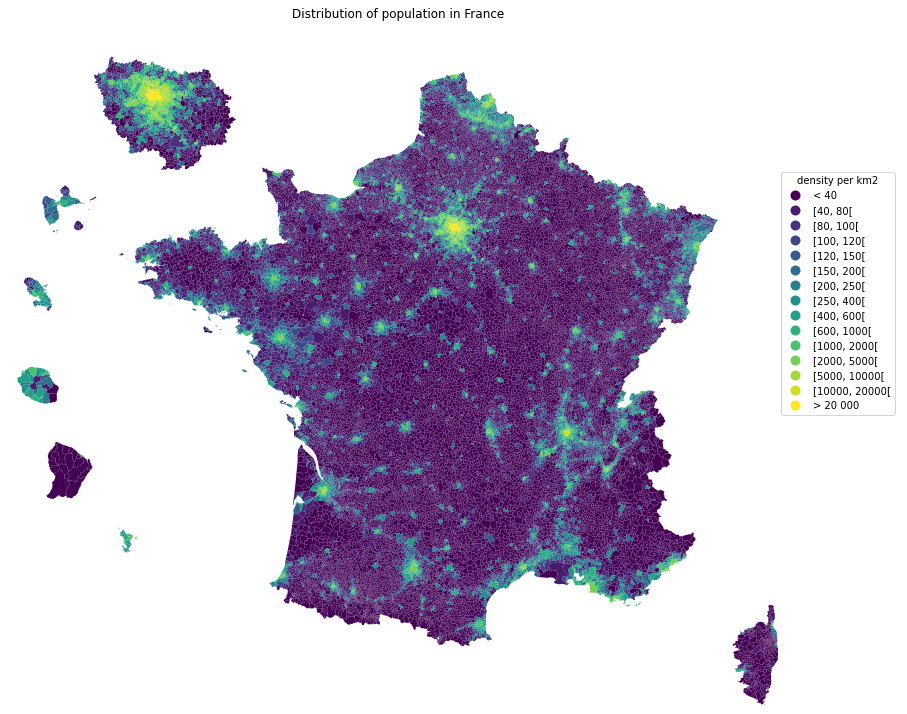Tools to Easily Search and Download Data From INSEE and IGN
Project description






pynsee package contains tools to easily search and download data from INSEE and IGN.
pynsee gives a quick access to more than 150 000 macroeconomic series, a dozen datasets of local data, numerous sources available on insee.fr, geographical limits of administrative areas taken from IGN as well as key metadata and SIRENE database containing data on all French companies. Have a look at the detailed API page api.insee.fr.
This package is a contribution to reproducible research and public data transparency. It benefits from the developments made by teams working on APIs at INSEE and IGN.
Installation & API subscription
The files available on insee.fr and IGN data, i.e. the use of download and geodata modules, do not require authentication. Credentials are necessary to access some of the INSEE APIs available through pynsee by the modules macrodata, localdata, metadata and sirene. API credentials can be created here : api.insee.fr
# Get the development version from GitHub
# git clone https://github.com/InseeFrLab/pynsee.git
# cd pynsee
# pip install .[full]
# Subscribe to api.insee.fr and get your credentials!
# Save your credentials with init_conn function :
from pynsee.utils.init_conn import init_conn
init_conn(insee_key="my_insee_key", insee_secret="my_insee_secret")
# Beware : any change to the keys should be tested after having cleared the cache
# Please do : from pynsee.utils import clear_all_cache; clear_all_cache()Data Search and Collection Advice
- Macroeconomic data :
First, use get_dataset_list to search what are your datasets of interest and then get the series list with get_series_list. Alternatively, you can make a keyword-based search with search_macrodata, e.g. search_macrodata('GDP'). Then, get the data with get_dataset or get_series
Local data : use first get_local_metadata, then get data with get_local_data
Metadata : e.g. function to get the classification of economic activities (Naf/Nace Rev2) get_activity_list
Sirene (French companies database) : use first get_dimension_list, then use search_sirene with dimensions as filtering variables
Geodata : get the list of available geographical data with get_geodata_list and then retrieve it with get_geodata
Files on insee.fr: get the list of available files on insee.fr with get_file_list and then download it with download_file
For further advice, have a look at the documentation and gallery of the examples.
Example - Population Map

from pynsee.geodata import get_geodata_list, get_geodata, GeoFrDataFrame
import math
import geopandas as gpd
import pandas as pd
from pandas.api.types import CategoricalDtype
import matplotlib.cm as cm
import matplotlib.pyplot as plt
import descartes
import warnings
from shapely.errors import ShapelyDeprecationWarning
warnings.filterwarnings("ignore", category=ShapelyDeprecationWarning)
# get geographical data list
geodata_list = get_geodata_list()
# get departments geographical limits
com = get_geodata('ADMINEXPRESS-COG-CARTO.LATEST:commune')
mapcom = gpd.GeoDataFrame(com).set_crs("EPSG:3857")
# area calculations depend on crs which fits metropolitan france but not overseas departements
# figures should not be considered as official statistics
mapcom = mapcom.to_crs(epsg=3035)
mapcom["area"] = mapcom['geometry'].area / 10**6
mapcom = mapcom.to_crs(epsg=3857)
mapcom['REF_AREA'] = 'D' + mapcom['insee_dep']
mapcom['density'] = mapcom['population'] / mapcom['area']
mapcom = GeoFrDataFrame(mapcom)
mapcom = mapcom.translate(departement = ['971', '972', '974', '973', '976'],
factor = [1.5, 1.5, 1.5, 0.35, 1.5])
mapcom = mapcom.zoom(departement = ["75","92", "93", "91", "77", "78", "95", "94"],
factor=1.5, startAngle = math.pi * (1 - 3 * 1/9))
mapcom
mapplot = gpd.GeoDataFrame(mapcom)
mapplot.loc[mapplot.density < 40, 'range'] = "< 40"
mapplot.loc[mapplot.density >= 20000, 'range'] = "> 20 000"
density_ranges = [40, 80, 100, 120, 150, 200, 250, 400, 600, 1000, 2000, 5000, 10000, 20000]
list_ranges = []
list_ranges.append( "< 40")
for i in range(len(density_ranges)-1):
min_range = density_ranges[i]
max_range = density_ranges[i+1]
range_string = "[{}, {}[".format(min_range, max_range)
mapplot.loc[(mapplot.density >= min_range) & (mapplot.density < max_range), 'range'] = range_string
list_ranges.append(range_string)
list_ranges.append("> 20 000")
mapplot['range'] = mapplot['range'].astype(CategoricalDtype(categories=list_ranges, ordered=True))
fig, ax = plt.subplots(1,1,figsize=[15,15])
mapplot.plot(column='range', cmap=cm.viridis,
legend=True, ax=ax,
legend_kwds={'bbox_to_anchor': (1.1, 0.8),
'title':'density per km2'})
ax.set_axis_off()
ax.set(title='Distribution of population in France')
plt.show()
fig.savefig('pop_france.svg',
format='svg', dpi=1200,
bbox_inches = 'tight',
pad_inches = 0)How to avoid proxy issues ?
# Use the proxy_server argument of the init_conn function to change the proxy server address
from pynsee.utils.init_conn import init_conn
init_conn(insee_key="my_insee_key",
insee_secret="my_insee_secret",
proxy_server="http://my_proxy_server:port")
# Beware : any change to the keys should be tested after having cleared the cache
# Please do : from pynsee.utils import *; clear_all_cache()Support
Feel free to open an issue with any question about this package using <https://github.com/InseeFrLab/Py-Insee-Data> Github repository.
Contributing
All contributions, whatever their forms, are welcome. See CONTRIBUTING.md
Project details
Download files
Download the file for your platform. If you're not sure which to choose, learn more about installing packages.
Source Distribution
Built Distribution
File details
Details for the file pynsee-0.1.0.tar.gz.
File metadata
- Download URL: pynsee-0.1.0.tar.gz
- Upload date:
- Size: 9.0 MB
- Tags: Source
- Uploaded using Trusted Publishing? No
- Uploaded via: twine/4.0.1 CPython/3.9.12
File hashes
| Algorithm | Hash digest | |
|---|---|---|
| SHA256 | 39c9047ce2689fe05acb4cf72c6dbfb0906bd1f1d3b2cd5ce1240feb9d190a52 |
|
| MD5 | 989a4cfda657c12ae47109e5a01b108c |
|
| BLAKE2b-256 | de365c2cd079600b1f071a8a6b0c4d784aca80d790f6ef597c33e870e9e297b8 |
File details
Details for the file pynsee-0.1.0-py3-none-any.whl.
File metadata
- Download URL: pynsee-0.1.0-py3-none-any.whl
- Upload date:
- Size: 9.0 MB
- Tags: Python 3
- Uploaded using Trusted Publishing? No
- Uploaded via: twine/4.0.1 CPython/3.9.12
File hashes
| Algorithm | Hash digest | |
|---|---|---|
| SHA256 | b6c2083d7bf941a673758166bc05ab44244024f2d71387d109aa8d978db8c9ec |
|
| MD5 | e4267ffb26339073b18205b3aa4af5e8 |
|
| BLAKE2b-256 | 68e623f1562bfeffa26d0b0058dbc5d42c853b9dddab00f199433e30e18419f2 |











